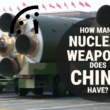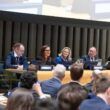Remember our humanity, forget the rest
By Selim Can Sazak, January 3, 2013
In her third Roundtable essay, Maryam Javan Shahraki continued to defend Iran's nuclear program against my criticisms of it. I consider her characterization of Iran's nuclear program thin on facts, and I must respectfully disagree with it.
Iran's nuclear activities do not operate under full oversight of the International Atomic Energy Agency (IAEA), despite what Iran says. For example, Iran has not complied with the agency's repeated requests to allow full inspections of the Parchin explosives-testing facility. Shahraki mentions a 2005 IAEA inspection of the Parchin facility and presents it as evidence of Iranian transparency and compliance with agency safeguards, but this is a serious anachronism.
Iran's failure to provide unrestricted access to nuclear sites has been affirmed at the agency's highest level. In December, IAEA Director General Yukiya Amano reiterated the agency's concerns about the Parchin facility and urged Iran to allow inspection of it. In September, Amano stated that "Iran is not providing the necessary cooperation to enable us to … conclude that all nuclear material in Iran is in peaceful activities." So, contrary to Shahraki's assertion, agency inspectors have not been allowed to visit the country's nuclear sites "whenever they want." Facts speak louder than words.
Shahraki points out that positive diplomatic momentum is developing between Iran and the agency. This is somewhat encouraging, but the history of nuclear diplomacy indicates that hopes should not be raised too high until negotiations bear material results. Moreover, among the reasons that diplomatic initiatives have failed so far is that Iran continues to insist that issues investigated by the IAEA should be considered closed once the agency's questions have been addressed, whereas the agency wants the ability to revisit topics as needed. Where is the logic in using current compliance to ask the agency to renounce its right to carry out safeguards activities in the future? And again, why fear scrutiny if there is nothing to hide?
At various points in this Roundtable, as Shahraki has disputed my criticisms of Iran's nuclear policies, she has employed arguments that I believe focus not on the issues under discussion, but instead on me. In her third essay, she attempted to highlight divergences between my views and those of the government of Turkey, which supports a diplomatic approach to the impasse over Iran's nuclear program. First, though I am Turkish, nowhere in my first two Roundtable essays did I express any endorsement of Turkey's official policies; therefore, I cannot be held responsible for those policies. Second, I happen to agree with my government and Shahraki herself that a diplomatic approach to the deadlock is best — although I remain extremely skeptical of diplomacy's prospects for success.
In her third essay, Shahraki cast doubt on my assertion that I do not subscribe to any "axis-of-evil" notions. I understand her to imply that I harbor pro-American or pro-Israeli views. My personal allegiances are irrelevant to my academic viewpoint, but I would note that I strongly condemn extrajudicial assassinations of Iranian scientists; I believe that the 2010 fuel-swap deal among Iran, Turkey, and Brazil was an optimal solution to the Iranian nuclear crisis, and should not have been scuttled; and I assign a measure of blame to both the United States and the European Union for the continued failure of negotiations (though, because two wrongs don't make a right, I also hold Iran responsible for the failure of negotiations).
Paradise or death. All this aside, I continue to believe, as I wrote in my first essay, that an Iranian or credible North Korean nuclear weapons capacity would entail major proliferation risks (though the proliferation might be vertical rather than horizontal). So I fully concur with Beenish Pervaiz that a real framework for the abolition of nuclear weapons must be established — "one that provides for the systematic, verifiable elimination of nuclear weapons and in the process further delegitimizes them."
That, however, will require that the world display decency, humility, and maturity. When physicist Joseph Rotblat accepted the 1995 Nobel Peace Prize in conjunction with the Pugwash Conferences on Science and World Affairs, he drew on the 1955 Russell-Einstein Manifesto to remind us that achieving a world free of war requires us to:
"Remember your humanity, and forget the rest. If you can do so, the way lies open to a new Paradise. If you cannot, there lies before you the risk of universal death."
Topics: Nuclear Weapons
Share: [addthis tool="addthis_inline_share_toolbox"]














